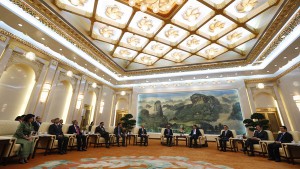The U.S.’ efforts to keep leading western countries out of the new China-led international development bank have been dealt a blow. Last week, Britain announced it would join the $50 billion Asian Infrastructure Investment Bank (AIIB), a likely rival to the World Bank based in Washington. Now France, Germany, and Italy have agreed to follow Britain’s lead.
In the past, Australia, an important US ally, has faced pressure from America to stay out of the new bank but has now claimed it will now rethink that position.

The recent European decisions represent a significant setback for the Obama administration, which has argued that western countries could have more influence over the working of the new bank if they stayed together on the outside and pushed for higher lending standards, the Financial Times article explains.
Britain aims to become the number one destination for Chinese investment, signing up to the new Chinese-led bank before the other members of the G7. The government claimed it had to move quickly because of the upcoming May 7 General Election.
The US Treasury has voiced concerns about the environmental and social standards the new bank attaches to its loans, citing the possibility for it to become a “low quality” institution. Japan shares similar concerns and is not expected to become a member.
Source: http://www.ft.com/intl/cms/s/0/0655b342-cc29-11e4-beca-00144feab7de.html#axzz3UbUEPL6A
A few U.S. analysts argue that it could be beneficial for U.S. to join AIIB as an internal critic. Though it is obvious that AIIB will spur China to gain larger financial strength, U.S. can work with Australia and South Korea and Japan to settle common principles of accession.
Interesting to see how much influence the sputtering Eurozone will have through the AIIB. Understandable that the US be troubled with a Chinese-led bank competing with the Washington-based World Bank. The US should realize that they are not China’s sole global partner, and in order to continue growth the Chinese government needs to continue to establish long-term arrangements with more developed economies.
See comments on a previous post on this issue. The US (or more specifically the US Congress) has blocked expansion of the World Bank, the Asian Development Bank and the IMF [maybe the African Development Bank and the Inter-American Development Bank as well], while the global economy has expanded. So isn’t this merely another country (or here, set of countries) stepping in to fill the gap from the refusal of the US to lead? Unless the Republicans get behind support for international institutions, we may see more such endeavors that leave us out.